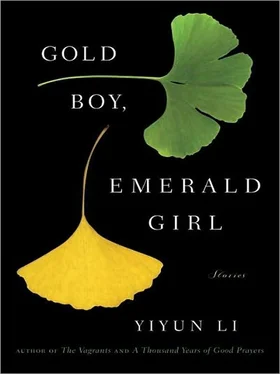Nine years later, the photographer, with his German-made cameras as evidence for his being a capitalist spy, was the first one in town to be beaten to death by the young Red Guards. By then Mei and Lan were both expecting their first babies, and Ailin, pressured by the other two’s achievements, rushed into marriage with a man whom she had barely known and would take years to fall in love with. He was not the first man the matchmaker had introduced to her, nor was his family the one best able to afford good betrothal gifts, but it was like the old saying: The one to show up at the right time beats the earlier risers .
On the morning of the wedding, while her two sworn sisters helped Ailin make up her face, she remembered, to her surprise, where the long and gentle fingers of the photographer had touched her chin when he had adjusted the angle of her face years ago. If she closed her eyes she could almost feel the momentary coolness when she was shielded from the bright light of the lamps, big and small, by his raised arms. Remember what the photographer wrote on our picture, Ailin asked, and then said how true it was that time swept past when they were the least prepared. Mei and Lan, both glowing in their new motherhood, laughed at Ailin for being a sentimentalist. Wait until this very night to discover what you haven’t known about life, said Mei, always the most outspoken one, without lowering her voice; Lan blushed but then agreed with a coy smile, and for a moment Ailin was intimidated by a looming void of which her two sworn sisters seemed unaware.
THE PICTURE WAS buried with a few pieces of her maiden clothes in a trunk that had been rarely opened in her married life, and when it was uncovered again, it was not by Ailin but by Ying, Ailin’s fourteen-year-old granddaughter on her summer holiday from Lisbon. Who were these girls? Ying asked her grandmother as she put aside the picture and tried on a blouse from the trunk. The moon white silk fabric had taken on a dull yellow hue, just like the faded picture from fifty years ago, but she seemed to be impressed by herself in the old-fashioned blouse. She parted her hair, dyed reddish yellow, in the middle and braided it, but the hair was unruly from her perm, and after a few trials she let go and focused on a tortoiseshell comb missing a few teeth.
They had been best friends, she and the other two girls, Ailin said, but did not explain the ritual of sworn sisterhood for fear of being laughed at, which happened sometimes when she talked about the past with her granddaughter. Ying picked up the picture again and studied it. Sweet, she said, as one would speak of a puppy.
If her granddaughter was home for stories Ailin would tell her stories, but she knew that even though the girl acted nonchalant when her childhood friends admired the pictures she brought home, in which she posed in an exotic city with stately buildings, grand statues, and blue harbors with white boats, Ying already had too many stories of her own to shoulder. Five years earlier, after the death of Ailin’s husband, her only son had decided to emigrate to Portugal, and Ailin, knowing that her opinion was the last thing sought from her, had given him the money he had requested without voicing any doubt. Ailin had thought of suggesting that they could leave their only daughter for her to raise, but Ying had been the one most eager to leave for a foreign life.
She was a good helper in the restaurant, Ailin’s son soon called to report, and became even more useful when she picked up Portuguese and learned to deal with the paperwork and officials for her parents. Every summer she came back to Ailin’s home for two weeks of vacation, an award for her contribution to the prospering restaurant, but apart from quietly showing off her new life to friends and neighbors, Ying was also in charge of purchasing handmade tablecloths and napkins, decorated with the embroidery the province had been known for in the past thousand years and still cheap if one knew which village to go to.
Life was good, and the business had never been better, Ying reported every summer, with fewer details each year, and Ailin learned not to ask for more than what was provided. If the girl wanted to tell stories, Ailin was all ears, but Ying was at an age where the line between the real and the imagined was blurred, and the tales she thought impressive invariably bored Ailin, though she was careful not to show it.
TOWARD THE END of Ying’s stay the girl brought home a poster-sized print of Ailin’s picture with her sworn sisters. The store had Photoshopped it for better effect, Ying explained. The three girls in the sepia-toned print smiled dreamily, as if a shared mystery had cast a mist that separated them from the rest of the world. What was this for? Ailin asked, and the girl replied that the picture was to be part of the new decorations for a section of the restaurant divided from the main floor. There were other pictures she had gathered, too, Ying said, old photos she had sought from her friends’ parents, and the store would have them ready in a day or two.
Ailin looked at the picture. She was sitting on a stone bench, her knees drawn to her body and clasped in both hands, as directed by the photographer. Look slightly upward as if being summoned, he had told her, though by whom he had not said. Mei and Lan stood behind her, each placing a hand on her shoulders and pointing the other hand to where all three were expected to look. All of it had been staged, and the painting of bamboo trees and waterfall on the background curtain, already faded fifty years ago, was recognizable perhaps only to Ailin’s eyes now. Still, the long-forgotten details came back with the enlarged images: The coiled ends of her braids, slightly burned even though it was hard to see in the picture, were the result of impatient curling with a pair of hot tongs; the jasmine blossoms in their top button holes were from Mei’s neighbor, a boy their age with a shy smile who liked to offer Mei the blooming flowers from his mother’s garden, but before any fruitful connection could be made from all the fragrant presents, the boy had to move away when his widowed mother remarried into another province; Lan, the prettiest of the three, had to be begged once and again by the photographer not to turn her face away, though if looking closely, one could detect the shying away of her face from the lens, and the photographer had skillfully caught her eyes just before she had averted them.
“How much does it cost to make this?” Ailin asked as she fingered the fabric of the print.
Ying gave Ailin a number that took her aback, and Ailin commented that despite the amount of money spent, the picture looked even older than it was.
“That’s the effect I need.”
“Did you talk to your parents before making this?”
“Why should I?” Ying said. “They’ll love it if I tell them that this is what the guests have been asking for. Besides, they say the restaurant will be mine someday, so why can’t I make the decision now?”
Ailin thought about lecturing her granddaughter on filial respect, but Ying would only roll her eyes and laugh at her outdated and useless wisdom. “I don’t see why anyone wants to look at some girls from ages ago while eating at your restaurant.”
“All three of you look very young and innocent. Very Chinese.”
“We certainly didn’t take the picture to entertain some foreign devils,” Ailin said dolefully.
“But you don’t mind, do you?” Ying said. “And your friends — will you not tell them about this? I don’t want them to come to me and ask to be paid.”
The girl was too young to worry about such things, Ailin thought, saddened by the fact that her granddaughter had less space and time to dream than Ailin herself had once had at this age. She would not let the secret out to her friends, Ailin replied, but Ying looked doubtful.
Читать дальше
Конец ознакомительного отрывка
Купить книгу












